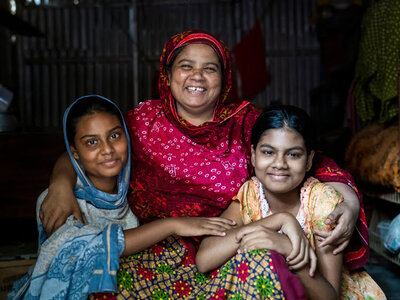Bangladesh
- 16 million
- people are food insecure
- 1.1 million
- Rohingya refugees
- 174 million
- population
With a population of 174 million and a relatively small land size, Bangladesh is among the most densely populated countries in the world.
Following widespread student protests in 2024, which led to the formation of an interim government, the country is preparing for national elections in February 2026.
While on track for graduation from Least Developed Country (LDC) status and despite notable economic progress in recent decades, Bangladesh continues to face persistent development challenges.
Food insecurity and malnutrition remain pressing concerns. An estimated 16 million people are facing acute food insecurity, and 1.6 million young children are acutely malnourished. Weather shocks, inflation, economic pressures and humanitarian funding gaps are among the contributing factors.
Bangladesh is extremely disaster-prone due to its low-lying geography. With WFP’s support, Bangladesh is regarded as a leader in Anticipatory Action (AA) and is advancing efforts to strengthen early warning systems and reduce disaster impacts.
WFP has operated in Bangladesh since 1974. Today, its operations exemplify WFP’s ability to balance large-scale humanitarian assistance with long-term national development programmes. In 2024, WFP reached nearly 4 million people with emergency and resilience support – the highest in recent years.
WFP has been a key partner in building Bangladesh’s social protection system for over five decades, evolving from food aid to integrated, lifecycle-based safety nets.
After nearly a three-year pause, the Government is launching its new national school feeding programme, aiming to reach 3 million children over the next three years with nutritious school meals, with WFP’s support.
Now in its 9th year, the Rohingya response is facing severe funding shortages across sectors. WFP continues to provide critical food, nutrition, school feeding and resilience-building support to the Rohingya population, now over 1.1 million people.
What the World Food Programme is doing in Bangladesh
-
Rohingya refugee response
-
WFP provides general food assistance through an e-voucher model, promoting choice and dietary diversity, alongside nutrition services, school feeding and resilience-building initiatives. In host communities, WFP supports livelihoods, market linkages and disaster risk reduction to address vulnerability to extreme weather events, strengthen food security and foster social cohesion.
-
Nutrition
-
Social protection
-
School feeding
-
Climate adaptation
Bangladesh news releases
Go to pagePartners and donors
Find out more about the state of food security in Bangladesh
Visit the food security analysis pageOperations in Bangladesh
Contacts
Office
UN House – House 1, Level 6-8, Road 86/88, Gulshan-2, Dhaka-1212
Dhaka
Bangladesh





